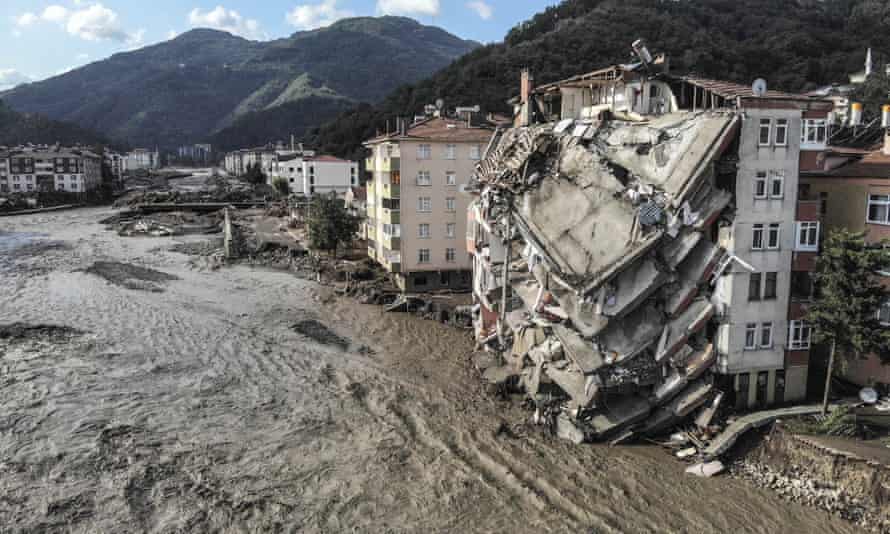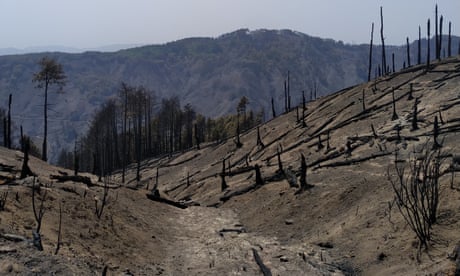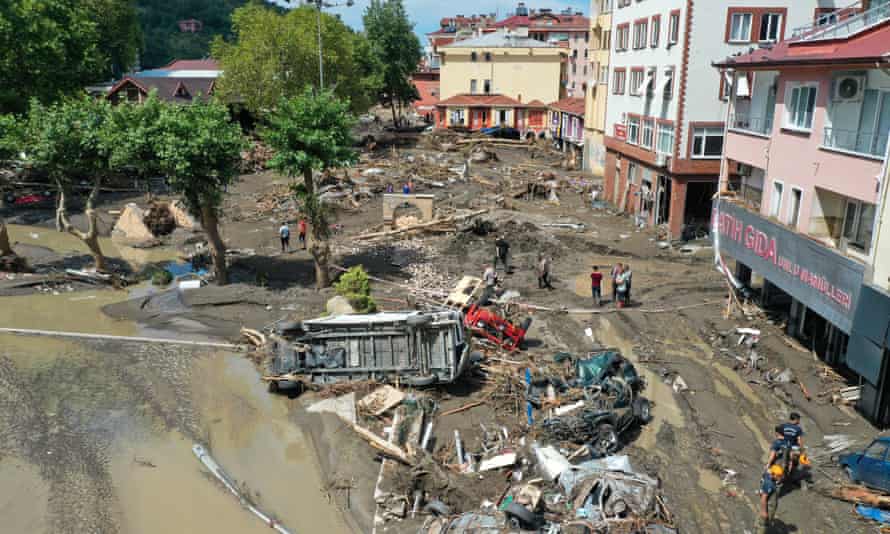Turkey flood deaths rise as fresh fires erupt on Greek island of Evia
Twenty-seven killed in Turkish flash flooding, with southern Europe bracing for more extreme weather

The death toll from flash floods in Turkey has reached 27 and fresh wildfires erupted on the ravaged Greek island of Evia, as southern Europe braces for more extreme weather events caused by human-made climate change.
Record Mediterranean heatwaves fuelled blazes that have devastated parts of Italy, Turkey and Algeria, with Spain and Portugal on high alert, while Turkey’s Black Sea region has been hit by some of the worst floods in living memory.
Turkish emergency workers fought on Friday to relieve the worst-hit areas, with the country’s northern provinces plunged into chaos just as authorities declared the wildfires that had raged through its southern coastal regions for a fortnight, killing eight, under control.

Torrents of water tossed dozens of cars and heaps of debris along streets, bridges were destroyed, roads closed and electricity supplies cut to about 330 villages, with more than 1,700 people evacuated, some with the help of helicopters and boats.
“This is the worst flood disaster I have seen,” the interior minister, Süleyman Soylu, said after surveying damage that extended across the provinces of Bartın, Kastamonu and Sinop. “The risk that our citizens face is high.”
The agriculture and forestry minister, Bekir Pakdemirli, said the area was facing “a disaster that we had not seen in 50 or 100 years”, with weather forecasters predicting more heavy rain in the hours and days to come.
Twenty-five people have died as a result of floods in Kastamonu and another two died in Sinop, Turkey’s disaster and emergency management authority (AFAD) said. Five bridges collapsed and many others were damaged.

“I am 75 years old and have never seen anything like this,” a Bartın province resident, Adem Senol, told the Anadolu state news agency. “The water rose higher than the level of our windows, it broke down our door, even a wall.”
The natural disasters, which scientists agree are becoming more intense and frequent because of global heating caused by harmful emissions, pose a challenge to Turkey’s powerful president, Recep Tayyip Erdoğan, two years before general elections.
Erdoğan, who was due to visit the flood-hit region late on Friday, was heavily criticised on social media for his response to July’s wildfires, and polls show the climate is a top priority particularly for younger voters.
Elsewhere, soaring temperatures and low humidity continued to create ideal conditions for wildfires, with a new blaze breaking out on Greece’s second-largest island, Evia, south of the area where a massive wildfire decimated 50,000 hectares (125,000 acres) of pine forest and countless homes.
The Greek fire service said four firefighting aircraft and six helicopters were tackling the new fire in central Evia, along with 23 firefighters and 10 vehicles. The larger fire, which broke out on 3 August, destroyed most of the island’s north and was still smouldering on Friday.
Two more big fires were also still burning in the southern Greek region of the Peloponnese, where hundreds of French, German, Austrian and Czech firefighters helped their Greek colleagues.
A multinational firefighting force assisting Greece will remain in place, said the civil protection spokesperson, Spyros Georgious. The prime minister, Kyriakos Mitsotakis, has called the fires Greece’s “greatest ecological disaster in decades”.
Several other Mediterranean countries have suffered wildfires in recent weeks. In Italy, firefighters have intervened hundreds of times in Sicily, which on Wednesday recorded what is thought to be Europe’s highest ever temperature of 48.8C (119.8F), and in the southern Calabria region. Local people were evacuated from Tivoli, east of Rome, on Friday.
In Spain, where temperatures are expected to hit 46C in some places this weekend, firefighters on Friday tamed a blaze in Catalonia but another fire continued to burn near the town of Rubia in the north-west.
Spain’s national weather office, AEMET, said almost the whole country faced a high, very high or extreme risk of wildfires on Friday, with 15 of its 17 autonomous regions on alert for high temperatures.
The Portuguese government placed 14 of the country’s 18 regions on fire alert, with the prime minister, António Costa, warning the next few days would be difficult, while blazes have killed 71 people in northern Algeria and dozens of fires have been recorded since Monday in Tunisia.
Worsening drought and heat linked to climate change have fuelled wildfires in the western US and in Russia’s northern Siberia region, where a state of emergency was declared on Friday to mobilise firefighting resources from other Russian areas.
On Friday, officials reported 117 active forest fires burning across nearly 1.4m hectares in the vast north-east Siberian territory of Sakha, also known as Yakutia, which covers more than 308m hectares. Experts have said a 2007 decision to disband a national air network tasked with spotting fires contributed to the disaster.
<img border="0" width="468" height="120" alt="" src="https://www29.a8.net/svt/bgt?aid=201220451414&wid=001&eno=01&mid=s00000016990001015000&mc=1"></a>
<img border="0" width="1" height="1" src="https://www11.a8.net/0.gif?a8mat=3BSUOZ+6UHH82+3N3G+61JSH" alt="">
<img border="0" width="640" height="100" alt="" src="https://www21.a8.net/svt/bgt?aid=201213369690&wid=001&eno=01&mid=s00000021462001035000&mc=1"></a>
<img border="0" width="1" height="1" src="https://www14.a8.net/0.gif?a8mat=3BSP89+BET46Q+4LLO+65U41" alt="">